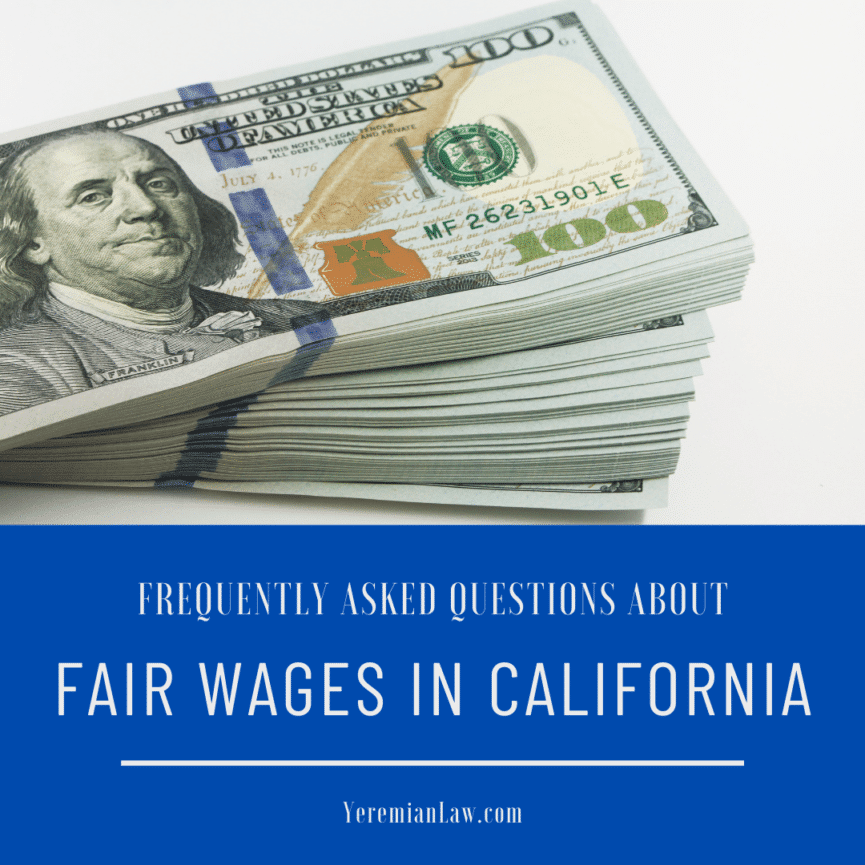If you’re like most people, you know that your employer has to pay you fair wages for the hours you work – but what are fair wages, and is there a “fair wage act” that governs how much an employer must pay? This guide explains.
FAQ on Fair Wages in California
The Fair Labor Standards Act, or FLSA, governs how much an employer has to pay an employee. FLSA says that employers must give employees at least the current federal minimum wage. However, when a state law provides for a higher minimum wage – like California’s does – then employers are required to pay employees at least the state minimum wage. (If an employer doesn’t pay you at least that amount, you may have a minimum wage dispute on your hands.)
Related: California’s minimum wage for 2021
Check out these commonly asked questions about fair wages in California. If you don’t see your question answered here, or if you do see it and have more questions, please call us at 818-230-8380 to schedule a free consultation with a Los Angeles employment lawyer.
What’s Covered Under the Fair Labor Standards Act?
The Fair Labor Standards Act establishes minimum wage, recordkeeping, overtime pay and child labor standards that affect workers. Most people are primarily concerned about the law’s minimum wage provisions and overtime provisions (because recordkeeping applies to businesses and it’s simply illegal for children to be put to work).
Who Does FLSA Protect?
FLSA protects people who work for a wide range of companies. In fact, employees of companies that are engaged in interstate commerce, producing goods for interstate commerce, or handling, selling or other wise working on goods or materials that have been moved in or produced for such commerce by any person are covered.
That may seem like only workers for the biggest companies are protected, but that’s not the case. Courts have ruled that using the mail, email and even phones to place or accept interstate business calls or take orders has subjected the employer to FLSA.
Should I Be Paid Overtime, and is Overtime Part of Fair Wage Law?
You should absolutely be paid overtime if you work enough hours. However, there’s something you need to know: California law provides you with more protection than federal law does, which means courts defer to California law when a case arises.
The following table explains how overtime works in California, including how much pay you’re entitled to receive after working a certain number of hours.
| Hours Worked | Mandatory Pay |
| 8 hours in one day | Regular pay rate |
| 8+ hours in one day | 1.5 times regular pay rate for time worked over 8 hours |
| 8 hours on the 7th consecutive day of work | 2 times regular pay rate |
| 12+ hours in one day | 2 times regular pay rate for time worked over 12 hours |
| 40 hours in one week | Regular pay rate |
| 40+ hours in one week | 1.5 times regular pay rate for time worked over 40 hours |
What that means is that your regular pay rate is multiplied for every hour you work over the standard number of hours. For example, if you work 9 hours in one day, you’re entitled to 8 hours at your regular pay rate, plus 1 hour at 1.5 times your regular pay rate.
Here’s what that looks like: If you make $20 per hour and work 8 hours in one day, you earn $160. However, if you make $20 per hour and work 9 hours, you make an additional $30 for that ninth hour. That means your total paycheck will be $190.
Related: Not a “New” Overtime Law: How does overtime work in California?
Do You Need to Talk to an Attorney About Fair Wages?
If you need to talk to a lawyer about fair wages, or if you suspect your employer has withheld pay it owes you, we may be able to help you. Call us at 818-230-8380 or fill out the form below to schedule your free consultation now.




